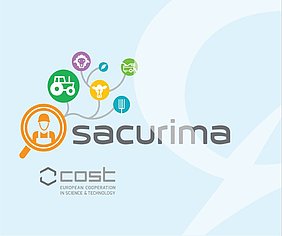Results of the COST Action Safety Culture and Risk Management in Agriculture Sacurima (CA16123) are now published. The study presents policy recommendations and offers guidance for improving safety training and education of farmers. Sacurima Cost Action CA16123 was coordinated by the Natural Resources Institute Finland (Luke).
Agriculture is one of the most hazardous industries in the European Union (EU). Statistics show considerable differences in national injury and illness rates, as well as in approaches and support systems for prevention. Understanding the determinants of safety culture is generally poor. Consequently there is a lack of well-informed actions to improve health, safety and risk management. The COST Action SACURIMA explored the reasons why agriculture still lags behind other sectors, and why some countries have been more successful than others in reducing agricultural injuries and illnesses.
ATB-scientist Dr. Martina Jakob participated in the COST Action right from the start. She participated in Working Group 1 and was author for chapter 2 of the report.
“The study revealed that behaviours linked to the avoidance of farm accidents such as machine handling and handling of chemicals and pesticides are to a significant extent determined by socio-cognitive factors such as attitudes, perceived social norms and perceived control. Also, factors in the social and physical environment, notably the safety culture within the farmers’ community and perceived obstacles, play an important role”, she explains. “Our survey clearly shows that farming remains a dangerous profession, and increasing farm safety should be a priority. In order to further improve prevention efforts, we need to better understand what drives farmers to behave safely”, says Martina Jakob.
The policy recommendations presented by the Sacurima COST Action were to
- Integrate Occupational Safety and Health (OSH) into current and future agricultural policies,
- Establish a European Network for agriculture safety and health,
- Allocate specific funding for Agriculture OSH research in Horizon 2020/Horizon Europe,
- Develop and implement OSH education and skills programmes for farmers and workers in the agriculture sector and
- Improve statistics to reflect the true levels of agricultural workplace fatal and non-fatal injury and ill health.
The report is available online:
Leppälä, J., Griffin, P., McNamara, J. & Rautiainen, R. (eds.). 2021. Safety Culture and Risk Management in Agriculture: Sacurima Cost Action CA16123 Highlights and Conclusions. Natural resources and bioeconomy studies 63/2021. Natural Resources Institute Finland. Helsinki. 81 p. https://jukuri.luke.fi/handle/10024/547926
Info on SACURIMA COST Action: https://www.sacurima.eu/
The publication is based on COST Action Safety Culture and Risk Management in Agriculture, supported by COST. COST (European Cooperation in Science and Technology) is a funding agency for research and innovation networks. The Actions help connect research initiatives across Europe and enable scientists to grow their ideas by sharing them with their peers. This boosts their research, career and innovation. www.cost.eu

